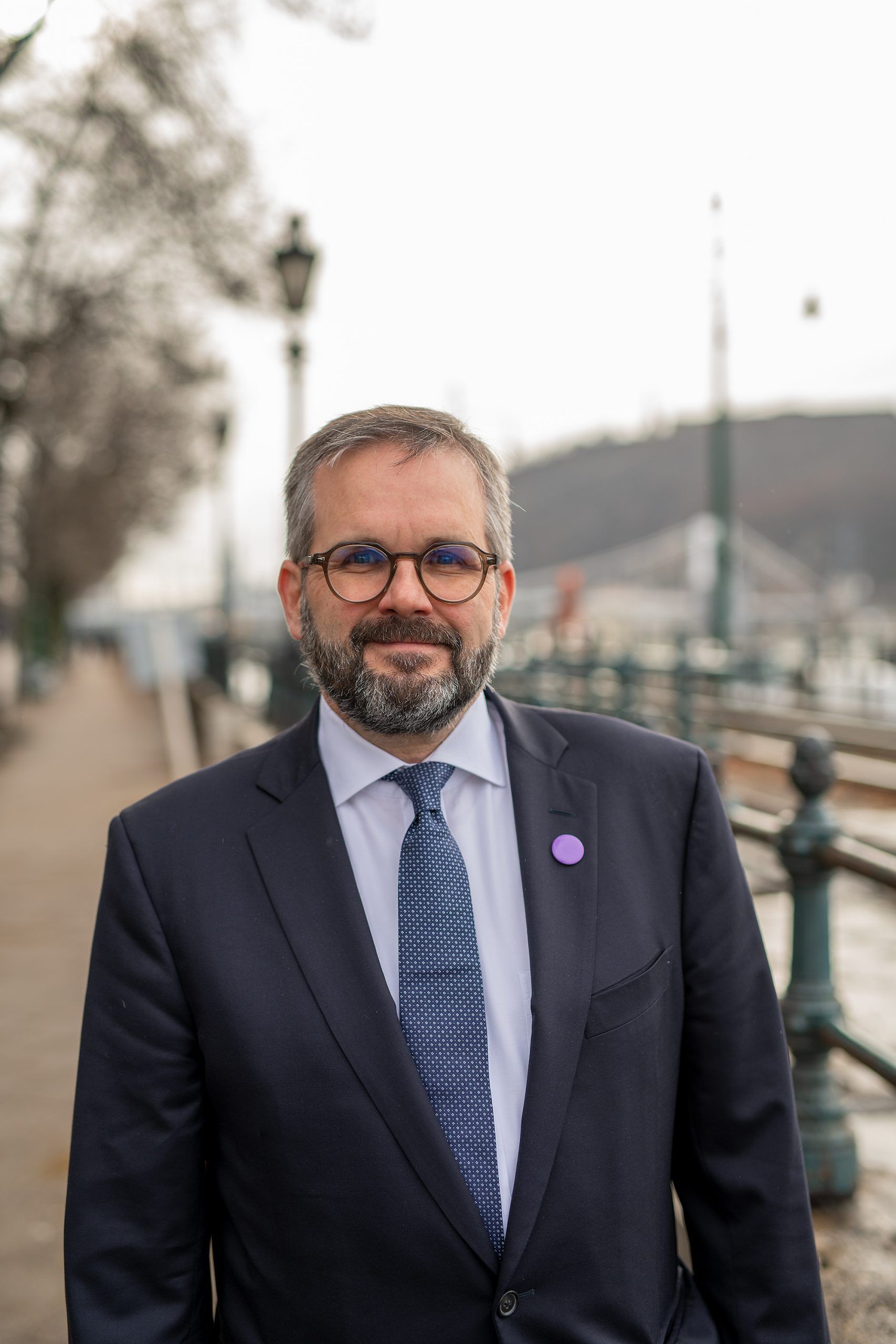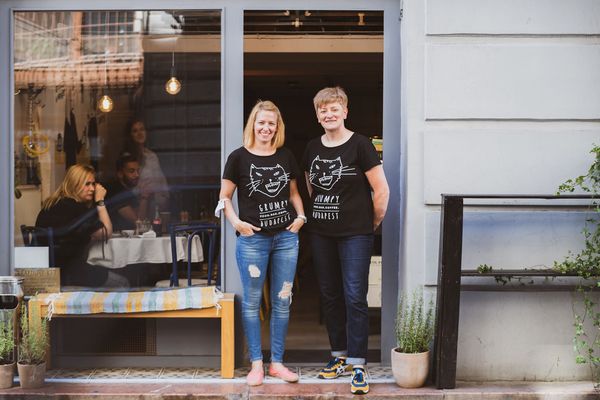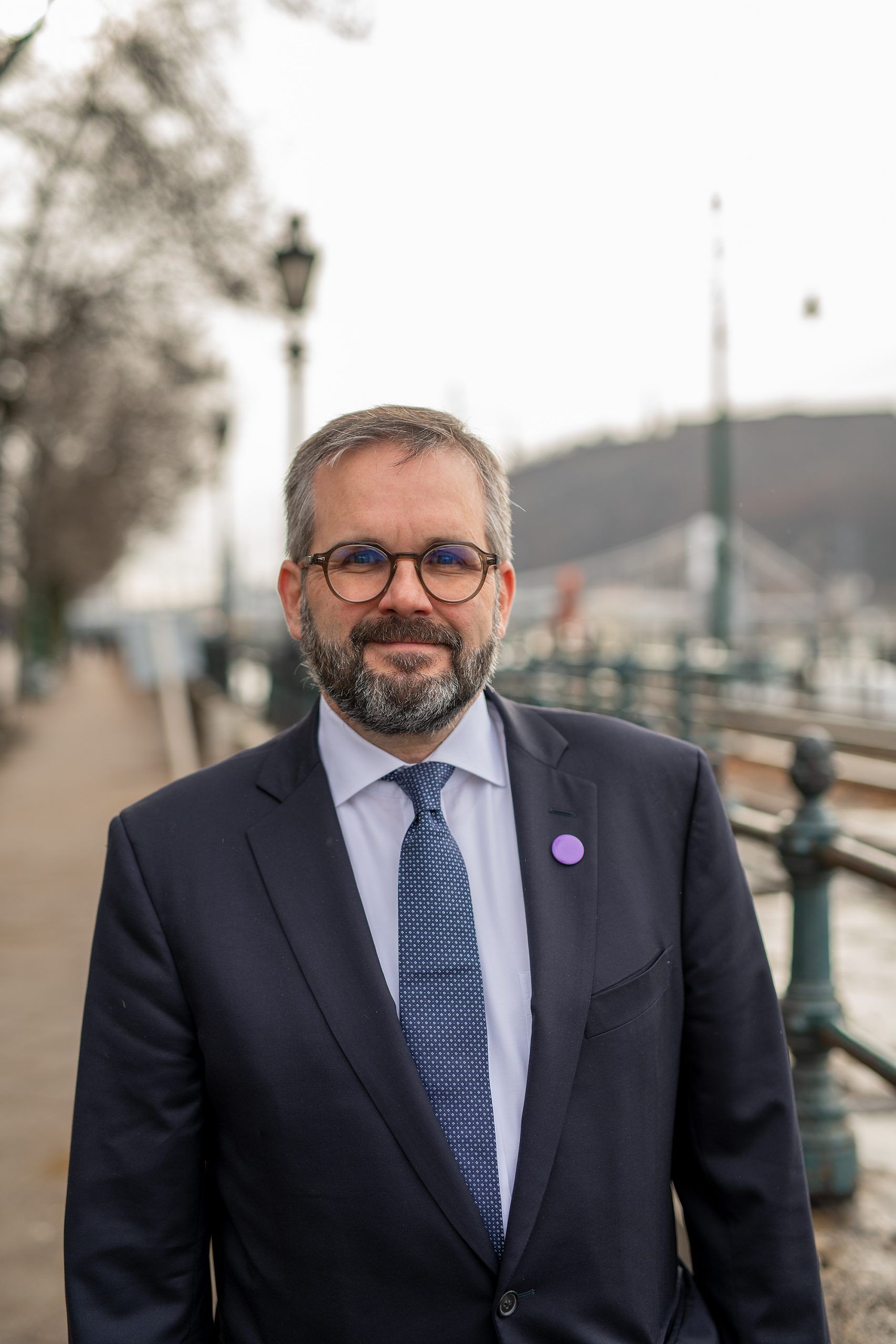We talked to Matthias Berninger, Vice President of Public Affairs, Science and Sustainability at Bayer, about the lack of innovation in Europe, sustainability and digitalisation, the future of agriculture and the rule of the masses. All the burning issues for our future, through the glasses of a company that spends more on development and research in agriculture than any other company or country in the world. Our exclusive interview.
You have had a very meaningful career; I mean you were an MP in Germany in the Green party for twelve years after that another twelve years in the public relations and affairs sector and Bayer came into the picture in 2019. During these decades, society’s attitude to climate change has changed a lot. How can you explain to those who have not yet understood the need for change why they should change their good practices?
For a very long time and I’m talking thousands of years, we have been living in what one could call a climate comfort zone. The climate was relatively stable but that is beginning to change. When I started out as a politician the assumption was that climate change would affect the next generation, however, what we now see is that it’s already affecting our present. In general, the rapid, major and very high consequences of climate change is probably the biggest argument to change something. And all of that is underpinned by data because 50 years ago or even 20 years ago, people could still argue we are not sure about the data confirming climate change but that’s no longer the case because the science is very clear.
The less developed countries and their market players have often accused the developed countries of having to suffer the consequences of actions imposed by them. On the one hand, they typically suffer more from the consequences of climate change, and on the other, they must protect the environment they still have. Can a global company like Bayer play a mediating role in this debate?
I don’t think that we can be mediating between governments because ultimately, what’s called a just transition has to be agreed between governments that may be mediating between the private sector. In case of less developed countries what we can do as a business is to broaden our focus. For example, when you look at agriculture, we have decided to pay much more attention to the half billion smallholder farmers around the world who are the backbone for nutrition in many of the least developed countries. In this case we can focus on providing more access to health—something which we also do—but we can’t really be the mediators between the governments. And we must understand that the countries that are poorer say: “well, we also want to electrify our countries”.
We’re talking about relations between countries and companies—and the assessment of COP26 is quite mixed. What conclusions can Bayer draw from COP26?
I’ve been attending quite a few of those conferences. Not all twenty-six, but quite a few and for me, this year is one of the better ones. The reason is that a couple of decisions have been taken that were unthinkable even three years ago. Just to give you an example: a large number of countries, including relevant states where those forests are, have agreed to stop deforestation by the end of this decade. Deforestation contributes to global warming, roughly in the same way as all the transportation related emissions so that’s a lot. Also, the decision to reduce methane emissions has a huge impact. These are meaningful decisions and that is something we now need to deliver against and even the fact that those decisions have been made is certainly progress. Central-African countries, Indonesia, even Brazil agreed and that was a big deal. What’s not good is that the amount of reductions that the countries have committed to in Glasgow, will not be sufficient to avoid some of the worse effects of climate change. That’s been the problem and if you think about agriculture, even if we were super successful, and even if we are able to limit the global temperature increase by the end of the century, to 1.5 degrees Celsius, which was always the goal, we would lose between five and ten percent of the harvest. Based on what was decided in Glasgow so far, we are on track to lose 25% or more of all harvest or pork production. And that is at a time where the global demand for food increases. The conclusion is that the next two conferences have to determine how close we can get to reducing our emissions and then start to talk about adaptation. Because it’s one thing arguing that the temperature shouldn’t increase above 1.5 Celsius degrees, but if we’re not able to achieve that, then we also need to start caring about the consequences of this failure, which is loss of food, loss of biodiversity, and extreme weather events like floods that we’ve seen in Germany this summer, as well as extreme heat. We are currently on track for 1 billion people spending a significant amount of their time in deadly heat environments, so-called red bars. We need to start addressing those topics therefore adaptation needs to be much more in focus going forward than it was in the past.
László Bárdos | Hype&Hyper
You stated some conclusions. Do these have an impact on Bayer’s developments and innovations?
Bayer is one of the companies that can make a significant contribution to reducing carbon emissions, to removing carbon out of the atmosphere and through increasing resilience. For example, we believe that we can find alternatives to today’s fertilizers, which will reduce emissions, and we can work on enabling farmers to remove CO2 from the atmosphere. You’ll see digital, new economic practices and we might even get to a point where farmers can gain another source of income for removing carbon from the atmosphere, in addition to producing food and fibres. Then lastly, we can work on resilience, but we can also focus on addressing human health topics like extreme heat, tropical diseases that move further loss, energies, so all the topics that directly affect human health. In all three areas – reduction, removal, and resilience – Bayer can make meaningful contributions and help in addressing some of the problems we just described.
World leaders are setting targets for 2030, 2040, 2050. They seem to be thinking in timeframes that go far beyond government cycles. What is the timeframe that a global company the size of Bayer can realistically see and build a plan around?
When you spend more than five billion euros every year on research and development you need to look at longer time frames thus you can’t be super short focused because if you do that you will waste your money. It’s really important to have long time frames, insight, I mean, Bayer is more than 150 years old therefore looking at things through a generational lens is something we always have done. At the same time strategy without execution is hallucination because you need to have short term targets. One of the things we started to do in 2019 is that we added environmental and social key performance indicators to our financial capabilities. My salary depends on achieving carbon reduction in 2021, not in 2030 and I think that’s the combination you need to have a long-term perspective. You need to have key performance indicators that force you to act now, and in a business, key performance indicators help to make the right decisions, because business leadership teams are really skilled in balancing conflicting key performance indicators – something they can do much better than politicians. The challenge for businesses is that if you don’t balance the right key performance indicators, you don’t solve these kinds of big problems but if you throw in environmental and social key performance indicators to the mix of the financial rooms, you get this like really the strong skill of business leadership teams working towards addressing some of the problems we’re discussing today.

The European Green Deal contains a number of elements that have a significant impact on Bayer’s products, whether it is the phasing out of pesticide active ingredients, the development of new types of pesticides or the increase of organic farming from 8% to 25% of the EU average. How can Bayer adapt to these challenges without significantly increasing the price of raw materials and thus foodstuffs?
One of the good things about COP26 and also about the Green Deal is the political decision to prioritize decarbonization. If you as a business do not work towards achieving those goals, then your future is going to be rocky – if you’ll even have a future. For Bayer the crucial conversation is different. It’s about how can we benefit from the Green Deal by leveraging more than five billion euros research and development budget towards solving some of the problems the Green Deal wants to solve. I’ll give you an example: fertilizer is very expensive and in the case of normal companies, it’s usually the most expensive cost for farmers. Nowadays it’s even more expensive because energy costs have been rising and there are also global supply problems. If we found an alternative that replaced the chemical fertilizers with biological solutions, we would solve a problem for farmers and for the environment. These are the kinds of innovations we are looking for.
In the context of EU legislation, one side repeatedly says that scientific and technological progress often lags behind policy goals. It is said that scientific considerations are overridden by political interests. On the other hand, NGOs complain that economic considerations override climate objectives. How do you see the targets set in the Green Deal as being in line with the state of technology today?
I live in Washington DC, and when you look at the biggest risk for public climate debate in the United States it is inherently a bipartisanship. You have, let’s say, 45% who want to act on climate, you have 45% who absolutely don’t want to do anything, and you have 10% that make the difference. In Europe, this is not the biggest risk, you have a pretty broad coalition towards decarbonization. It’s not 100% of the political spectrum, but it’s still good. Europe’s biggest risk is related to the continents willingness to allow innovation. Europe is good at regulation but it’s not as welcoming to innovation as, for example, the United States.
What is the reason?
I think, in many ways, the reason is that in the past, people have been looking at the risk of an innovation more than the risk of an action. But there are also examples, such as that we are all vaccinated, and this is a result of a breakthrough innovation at the intersection of genomics, artificial intelligence and nanotechnology. Now, all three of those topics immediately raised eyebrows in Europe, including here in Hungary. If you’re talking about gene editing, people think it’s like GMO, but when they look at artificial intelligence or nanotechnology then people go like: “holy, holy”. But all three combined made mRNA vaccines available and these are breakthroughs. We know one thing for sure: tomorrow’s problems can’t be solved with yesterday’s technology. That attempt is going to fail because we can only solve tomorrow’s problems through radical innovation. The Haber-Bosch process was invented around 1910 and today, we still use the technology as it helps to feed 40% of the world population but also contributes to four percent of all greenhouse gas emissions globally. Therefore, if you find an innovation that takes out four percent of all carbon emissions, you better go for it and the risk of not doing so is higher than the risk associated with these new technologies. And that’s the lesson from vaccination as well.
The merger between Bayer and Monsanto has made significant waves. Monsanto is primarily known as a GMO seed company, but in the case of Hungary, the merger brought three innovation centres to Bayer, which were not involved in GMO development. How do you see the knowledge base of Monsanto helping Bayer to adapt to new challenges and develop products that meet them?
It is a fact that we invest more in agricultural research than any other business in the world and also almost any other country in the world. The only country that has a research and development budget in agriculture that is comparable with us is China. The reason for acquiring Monsanto was that it’s probably the company that had the largest innovation treasure box in the industry. We combine this treasure box with a very good understanding of next generations’ protection because we need that proper protection as a part of the resilience play. If you have a warmer climate, your crops are negatively affected by very different things than they are today, if you don’t protect your crops, you lose your harvest, and if you lose your harvest, you need more land to plant the amount of food we’re consuming. The general idea was to combine two innovative companies and solve some of the bigger problems. That part of the plan went really well. The problem is that that’s only a part of the plan as we are also well aware that we acquired a company that had a reputation that wasn’t in their favour. And that was a decision to kind of prioritize the innovation potential over the reputation of the past and we are still struggling to make that the prevailing view on this new business.
László Bárdos | Hype&Hyper
You gave us a general assessment, but I am still curious about whether it was a great decision, a good decision or just a decision?
For Bayer to be able to contribute to some of the big challenges related to climate change, it was a great decision. For Bayer dealing with some of the problems of today, it’s quite challenging.
The internet and social media have made information faster and messages simpler. Direct contact can be made with people who can raise or “bury” companies. From an outside point of view, NGOs seem to have adapted to this situation, but companies are lagging behind. Where is Bayer in this respect? Is it will or an ability to adapt to this simplified mass communication?
I have lots of direct interactions with NGOs, with political stakeholders, as well as with journalists via social media. Now, my kids will say I’m so boring using Twitter, and I should use something else, and I get that, but I believe that these technologies are extremely helpful for a more direct conversation. They have been especially helpful during the pandemic when you were less able to talk to people. I also believe that the technology companies have a responsibility to ensure that the conversation stays civil which by the way, was also true when newspapers were invented and probably even before when people told stories around the campfire, there was always a need to keep conversation civil. When you look at what’s currently going on with the large tech companies, their inability to do that got them into trouble. And the big shift is that for a company like Bayer we need to talk to our consumers, to the people that buy products from us, to the people who do business with us, to our own employees, to the political space and to our investors. We need to talk to them using these new media platforms because that’s where people are.
Do you have a specific social media strategy that you can share with us?
Well, I mean, our social media strategy is to focus on dialogue. So not to fear criticism, but to embrace a dialogue, and also to avoid those negative downward spirals when we communicate. Generally speaking, you can reach me on Twitter, you can comment on what I say, and I will respond. It’s very important to me that it’s not someone walking beside me, handling my Twitter, but it really is me replying.
How do you have free time to manage such a social activity?
It’s a very fast-paced way of interacting. The question is not how I have enough time, but how I use the time that I do have? Everybody has 1440 minutes a day so there’s always enough time, the question in this case is: are you using the time in the most appropriate way?
The pharmaceutical industry is also facing the challenges of social media. Sceptics of drugs and vaccines, conspiracy theorists, all find ways to multiply their voices. How can science, based on scientific facts, therefore stale, boring numbers and, in some cases, constant doubt, cope with campaigns based on half-truths and emotional communication?
Emotions always have a greater effect so it’s not even a close competition. If you want to regulate something, you need to demonize it first, and everybody does that. It’s one of the golden rules in politics. That’s why I think the question is a different one. The question is, how can you rally people emotionally behind science? That’s the more important question because you will never be able to win an argumentation that does not have emotions. The big success of Greta Thunberg is that she was able to put an emotional angle on the overwhelming science talking about the need for climate action. And that’s what we also need to do when it comes to innovation, agriculture, and also when it comes to innovation in health like vaccinations. I think it’s working much better than we give ourselves credit for. Because the same social media in which falsehoods about vaccinations are being propelled is also a social media in which the right things about vaccinations will be spread.

The digital transformation is usually discussed alongside agriculture and the green deal, but today, digitisation is already defining the chemical industry and the pharmaceutical industry. In what direction do you see Bayer’s perspectives moving forward?
If a company doesn’t take advantage of digitalization, then it’s not even really a company. We recently signed a partnership with Microsoft on digital agriculture. The future of farming will be much linked to digital transformation. Either way, not only in the large farm structures of the United States or even here, but also for smallholder farmers. We’re working on the digital transformation of smallholders and in Kenya, we reached 100.000 farmers and increased their yield by a sixfold. That gives you a flavour of the potential. We also made partnerships with other companies resulting in the combination of traditional agricultural technology, with new, digital technologies like drones, and export application of crop protection. All of that is happening as we speak, and the speed of it all is super fast. Bayer also looks at artificial intelligence in a broader sense, we asked one of the leading scientists in artificial intelligence, Fei-Fei Li to join our supervisory board. First, she asked: why do you need somebody like me? And the reason is that artificial intelligence is giving us possibilities we never had before. A very specific example: one of the biggest problems is to predict how proteins are folding. You have those long chains of amino acids, and then they fall into a three-dimensional structure, for example they resemble the outer shell of a virus. What the mRNA vaccine is doing is, it’s telling our own cells to produce a long chain of amino acids, that is then folding into a protein against which we build antibodies. But in the case of humans, it was impossible to predict how those proteins are folding. It’s a so-called protein folding problem. And a Google owned company called DeepMind has figured out how to predict and solve this problem, just around the time the pandemic hit. That’s the reason why we’ve had vaccines in record time. So, when you criticize tech companies, I believe Google actually deserves a lot of credit for what they have done. If you work on life sciences, this kind of artificial intelligence application is absolutely vital and crucial and that’s why I believe: a company that doesn’t embrace digitalisation doesn’t stand much of a chance in the future.

Wearable food, edible fashion

Hidden universes—dazzling caves of the region | TOP 5










